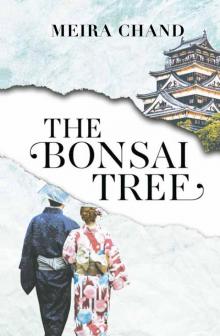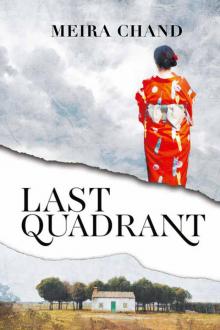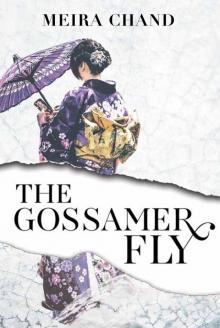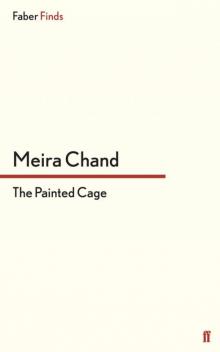- Home
- Meira Chand
A Choice of Evils Page 2
A Choice of Evils Read online
Page 2
No one before had been so pretty. Scarves hung extravagantly about her. Her hair swung and flamed about long earrings. Everything appeared in constant motion; earrings, skirts, scarves and hair. Grey eyes, pale as water, threw out a bold but quizzical stare. A strange energy seemed released from her. Lily glanced at Flora’s sobriety and the resolution of her mother, then returned her gaze to Nadya. She sighed, taking in once more the flaming hair and pulled at her own dark fringe.
‘My hair is not dyed. But I learned to rinse it in beer when I came to Shanghai. Better than beer of course, is champagne. But it’s too expensive, even in Shanghai.’ Nadya’s voice filled with regret. She saw no reason to mention the regular use of henna.
A slight frown creased Martha’s brow at these whispers of Shanghai decadence, but Lily breathed quickly. These were the things she wanted to hear, reports from another world. She was forced by her mother to shampoo her hair with spirit of soap from the hospital dispensary. She hated the green, unlatherable stuff with its medicinal odour.
The dinner was simple but good, and Dr Clayton talked of her friendship with Bradley Reed. It was warm even under the fan. Moths were thick at the window screen. A whiff of night soil upon the air reminded Nadya again that Nanking was a pedestrian Chinese town, not a cosmopolitan metropolis like Shanghai. There was none of Shanghai’s wanton clamour, swelling to fill the night. Here, all was order and decorum. Nanking lacked Peking’s majesty, and was devoid of Shanghai’s hedonism, crowded masonry and rapacious pleasure. Nanking had no foreign concessions. Unlike Shanghai its expatriates were not rich businessmen but professors, missionaries and the diplomatic corps. Yet, in spite of its staid reputation, Nanking was by day a bustling, populous city. Above it rose Purple Mountain, changing colour by the hour through a spectrum of blues and mauves. It was home to the golf club and Sun Yat-sen Mausoleum. At its base a spirit road of massive stone animals, standing or kneeling in pairs, led to ancient tombs. As the new capital of China, Nanking was seeded but ungrown. It was a town of avenues waiting for buildings. A main road bisected the city upon which stood the Metropolitan Hotel and the main ministries. There was only one fashionable shopping street. Nightclubs were few and the smoking of opium was frowned upon. The Government aimed at grandeur and modernity. Glamour was supplied by the presence of the Generalissimo and more visibly by Madame Chiang Kai-shek. For Nanking a new flowering seemed imminent. But some ambassadors as yet refused to move from Peking fearing dullness, and came and went between the two cities. Unlike Shanghai, Nanking disdained an elitist mentality. Its foreigners mixed easily with Chinese society.
Friends in Shanghai had groaned at the news of Nadya’s banishment. Nanking is a missionary convention, or a YMCA meeting, they said. She bought a new evening dress with gold trimmings and was warned frivolity was frowned upon; better to dress for a funeral. The only thing that appeared the same in each town was the rarity of young, unmarried, foreign women. Every night in Shanghai someone different had taken her dancing.
She did not wish to move to Nanking, but there was no refusing Bradley Reed. When she had arrived, almost penniless in Shanghai, he had given her a job without even a reference. She had only her experience on the People’s Paper of Blagoveshchensk, where she had worked as a proof-reader. Even there her opinions were too outspoken and, for her own good, she had been moved to a section of the Town Planning Association, compiling reports about roads and drainage.
When Bradley had first employed her, Nadya travelled regularly between Nanking and Shanghai. Usually she chose the night train, steaming into Nanking in the morning as they served a glass of tea. From the station she went straight to a hotel and then to the university. Rushing back to Shanghai she took charge of the proof-reading as the pages came off the presses of the China Weekly Review, which was printing the book. She was working directly under Bradley, supervising the documentation of TECSAT. It would be a while before she returned to Shanghai.
Across the table now Lily continued to stare relentlessly. ‘Your English is funny. Where are you from?’ she asked, breaking into the conversation.
‘Lily,’ Flora hissed. ‘I told you, from Russia.’
‘Before Shanghai I was in Harbin, which is in Manchuria, and before that I lived in Blagoveshchensk, which is in Russia. Originally, I was born in St Petersburg, but I hardly remember it,’ Nadya answered. The shadow of ornate stone buildings passed like half-obscured pictures through her mind. Then, she saw again the rough wooden houses of Blagoveshchensk, muddy roads and factory chimneys. Bleakest of all had been the gold mine with its convict labour that her father managed. Now, as an adult, things were revealed with exactness to her. As a child she had accepted her environment in the way a child accepts.
‘Do you have a husband?’ Lily enquired, putting down her knife and fork to concentrate the better. She ignored Flora’s kick beneath the table.
‘Not at the moment. But there was one. He came and went so quickly I hardly felt married at all,’ Nadya replied. It was unnecessary to reveal to this child that she had not in fact been married to Sergei. Lily expelled her breath slowly.
‘Why did you leave Russia?’ Flora asked, unable to stop the question, then blushing in embarrassment. Lily turned in triumph and returned the kick beneath the table.
‘To be free of the Communists. I fled with my husband. His name was Sergei Lekhovich. We hid on a boat and escaped to Harbin. Blagoveshchensk is a border town on the Amur River. Many people have escaped on those rivers.’
‘Oh,’ Lily breathed, leaning forward to cup her chin in her hands. ‘It’s like a fairy tale.’
‘Siberia is a place of snow and exiles.’ Flora recalled a geography lesson.
‘There is snow and there are exiles. But there is also much more,’ Nadya answered shortly, suppressing the complex mix of emotions stirring within her. She remembered wild duck against a winter sky and ripe wheat beneath the sun, rushing away to the distant horizon.
‘If you are from Russia, why do you speak English?’ Lily demanded.
Nadya laughed. ‘Because my father spent much time in England and France as a young man. He loved those countries. He saw that I learned their languages. I had an English governess, and a French one too for a while. But things changed in Russia, that way of life died. And my father moved from St Petersburg to Blagoveshchensk. Even there he saw that I continued to learn languages, teaching me himself.’
At the end of the table Martha listened to the interrogation, content for her daughters to ask the questions she herself would have put more discreetly. Lily’s excitement was plain to see; no emotion stayed hidden for long in Lily. Flora was different. She had been so small when her father died and yet, it seemed to Martha, Bill’s death left a residue within the child. In her early years she had absorbed too intense a knowledge of sorrow.
Bill had been killed in a year of great flooding and rain. Vast swathes of land disappeared under water, crops were ruined and famine began. Impoverished peasants swelled the bandit ranks and marched as an army upon a nearby market town, killing and looting, carrying off the rich for ransom. Parcels of ears and fingers were returned to waiting relatives. The horde moved on from town to town, each day edging nearer the mission. The hospital courtyard was already full of the bandit hoard’s wounded victims. Terrified refugees camped beside them.
Flora’s second birthday arrived in the midst of the panic. Bill carried her on his shoulders, her sandy curls mixed with his own. He galloped around the verandah, into the house and out again. She screamed with laughter as he stopped abruptly in front of Martha.
‘I don’t think we should leave the mission,’ he said. ‘We should show these bandits we’re not afraid, that God protects us.’ Some of the other missionaries in the area had already left their stations for safer places.
‘What about Flora?’ Martha replied. It had been a Sunday and she sat reading on the verandah. She tried to show no fear, but Bill did not know China well. She knew what hunger could do to men. The Ch
inese doctors at the mission had assessed their countrymen and also urged evacuation.
‘I think we should stay,’ Bill repeated. ‘The brigands will stop before reaching here. There’s no need for panic.’
‘That’s what father said at the time of the Boxer Uprising. In the end we ran for our lives. We were hidden in a loft by Chinese Christians for a week. Murderers climbed on the roof and peered through the windows. We lay flat on our stomachs all day so as not to be seen. It was summer and the heat was well over a hundred degrees. Food and water were only brought to us at night. The smell of our own stench was sickening.’
She could never forget that time, like a deep, dark well in her childhood, bottomless and black in its terror. ‘Eventually, we were smuggled out in coffins, taken to the Yangtze, and hidden again in a boat. It took ten days to get to safety. We hid in that boat like we had in the loft. My brothers were small and their health so broken when we reached our destination that they caught typhoid and died. I don’t think we should stay here.’ She had never opposed Bill before.
‘We live by faith, otherwise we would be continuously running from this or that in this benighted country,’ he answered.
She remembered then her mother’s faith throughout the Boxer ordeal and her strength in the midst of grief, and felt ashamed. She rose and put her arms around him. Still upon Bill’s shoulders, Flora laughed and pulled at Martha’s hair.
In the evening Bill got out his old motor-bike. At the beginning of their marriage she had watched him drive out on it to the dispensaries. It had been Dr Keswick’s idea to open small clinics in the countryside and to use them as feeders for the main hospitals. He had looked out across the plains of China with a proprietorial light in his eye, for he saw the dispensaries as evangelistic agencies. It was Martha who decided maternity clinics must be incorporated in them and her father agreed. Then she had discovered herself pregnant with Flora, and Bill had ridden off alone on his motorbike to the clinics leaving her behind until Flora was born.
I’ll show you there’s no need to panic,’ Bill had said that day, pushing the motor bike out of the mission compound. Before them the countryside stretched away serene as Martha rode pillion behind Bill, who roared up grave mounds still soggy with rain, raced along the pulsing river, and then up the steep ramp to the top of the city walls. The evening blew in Martha’s face, the sun set in the trees, illuminating the yellow roofs of a pagoda, sinking towards the grey mud walls. Bill was damp with sweat. The smell of him mixed with petrol fumes and night soil from the fields as she clung to his body. The memory of those odours remained with her, and she heard his voice reassuring her still.
‘There is nothing to be afraid of,’ he had said that day. ‘We’re together and God is with us.’
Yet his faith had been no protection against fate. Eventually, after he went missing, his body was found in a faraway place, spliced and hacked to pieces. Martha’s father, Dr Keswick, would not let her see the remains. The coffin was nailed down, even as she struggled against his decision. Now, so many years later, Martha pushed away the images filling her mind, and returned her gaze to her daughters who appeared already in thrall to the Russian woman at their table.
‘Why did your father move to Siberia?’ Lily demanded of Nadya Komosky, visualising inhospitable wastes of snow.
I don’t really know,’ Nadya replied. It was the truth. Something had gone wrong in St Petersburg of which she knew little. Gold mining under the Tsars had been a government monopoly. All mines belonged to the Imperial Court. No private individuals were allowed to search for the metal. Whatever the mistake her father had committed, his punishment had been mitigated. His exile to Siberia had been in the superior capacity of a government job. He was to mine gold for the Treasury.
‘My mother died when I was small, soon after we arrived in Blagoveshchensk. And my father a few years ago. I had only a horrid stepmother.’ Nadya laughed. Although she had tried to obliterate his memory she had suddenly, because of this conversation, to think of Sergei again. Even the thought of him made her angry. He had touched a wildness in her of which now she was ashamed. And she had also to think of her father. The anger in her doubled.
There was a rapid knocking at the front door, followed by the hurried footsteps of a servant towards it. ‘Here is Agnes,’ Martha said, putting down her coffee cup.
‘Agnes is a kind of Communist,’ Lily leaned forward, her tone conspiratorial as she offered the information. ‘What happened to your husband? Where is he now?’ She was anxious to know the end of the story before Agnes Smedley appeared.
‘He ran off to America with a man called Ivan Shepenov who was on the boat which brought us to Harbin,’ Nadya replied briskly.
‘A man?’ Lily’s eyes widened at this strange adventure. ‘Were you heart-broken?’ she asked. Listening to Nadya was like opening windows onto exotic landscapes.
‘On the contrary. I knew by then I did not love him. The shock was only to discover a man might love another man,’ Nadya answered.
‘A man can love another man?’ Lily did not dare look at her mother, fearing the condemnation in her eyes at these wanton tales, more decadent by far than Agnes Smedley’s stories of political adventure. She heard an intake of breath from Flora at this sudden education.
‘I also discovered they were both spies. Shepenov was an important spy and had recruited Sergei, who was no more than a tadpole, in Blagoveshchensk. The only money Sergei and I had were the few jewels my mother left me. They stole those from me and vanished,’ Nadya admitted but appeared unfazed by such duplicity.
Beside her Lily sat back as if in a trance and heard Martha clear her throat. The sound was not one of approbation and Lily knew her mother capable of finding alternative accommodation for a woman she considered unsuitable for contact with her daughters. Beside her Flora’s silence was also ominous, merging with Martha’s disapproval. And yet, neither had stirred at the sound of Agnes Smedley’s arrival, held to the table by Nadya. Lily crossed the fingers of both her hands. She would rather die now than lose Nadya Komosky.
There were footsteps in the corridor and the door was thrown open. Nadya looked in amazement at the woman before her in a dusty khaki uniform, threadbare puttees and muddy shoes. If she had not already heard about Agnes Smedley, Nadya might have been unsure of the gender of the figure in the doorway. Agnes pulled off her peaked cap, revealing hair cropped close to her scalp. Martha stood up with a smile to welcome Agnes and introduced Nadya.
‘She washes her hair in champagne. She was married once very quickly, but her husband was a spy and fell in love with another man. She hates Communists and left Russia to escape them,’ Lily burst out in a rush. Agnes Smedley turned to give Nadya a critical look.
‘Straight from the front, I presume?’ Martha interposed hurriedly, seeing the expression on Agnes’s face. She wanted no trouble from the unpredictable Agnes.
‘We were covered with lice,’ Agnes announced, running a hand over a head of stubble. ‘I had to have lice like everyone else, otherwise they said I couldn’t claim to belong to the army. Cleanliness is unproletarian. Share and share alike.’ Her blue eyes scanned Nadya who had lit a cigarette and drew upon it through an ivory holder. Agnes Smedley’s face was tanned as a peasant’s. The skin peeled off her nose.
‘What army?’ Nadya enquired. She thought Agnes Smedley looked ill beneath the weathering, as if she had a history of sanatoriums behind her.
‘The Eighth Route Army.’ Agnes regarded her with withering pity.
‘Agnes needs a bath and some clothes. Flora, what can we lend her that might fit? She has grown so thin in those mountains.’ Martha hurried to change the subject.
‘There is nothing but millet and salted turnips twice a day and sometimes not even that,’ Agnes informed them, going out of the door with Lily and Flora.
‘Is she really a Communist?’ Nadya enquired, as Agnes left for her bath.
Martha caught the edge in Nadya’s voice and shook her he
ad in perplexity. ‘Let us just call her an activist, a pro-China person like Edgar Snow or Anna Louise Strong. Agnes is also a writer and one of the few foreigners to have lived in the communist stronghold, Yenan. But I should tell you, she has never liked Mao Tse-tung and I believe he ordered her out of Yenan, branding her a troublemaker. She believes in the people of China, as do we all. Of course her views differ from mine about Chiang Kai-shek and many other things, yet you cannot but admire her courage. In these days of the United Front, the Christian community does what it can to help her. Everyone must work together to rid the country of the Japanese. She has come here now to get funds and medical supplies for the partisans and the Eighth Route Army. Argue with her at your peril,’ Martha advised.
‘Then, I would say she is an exhibitionist. But one who might also do some good work occasionally,’ Nadya broke off and said no more, seeing the look on Martha’s face. She inhaled deeply on her cigarette. She had the feeling lodging here might be no easy task.
At last Agnes Smedley reappeared and sat at the table in a skirt and blouse. She appeared out of character in these accoutrements. ‘We need Thomas splints for broken arms and legs,’ she announced to Martha. She began to eat at a rapid pace. Joan of Arc, thought Nadya, must have looked like this, with her rejected femininity, cropped hair and fighting clothes. The same spirit might have burned in her.
‘Thomas splints are imported items but I can lend you one that could be copied by the local factory,’ Martha suggested.
‘You cannot imagine what it’s like up there,’ Agnes said, shorn head turned away from Nadya. ‘The poverty is ghastly. The partisans fight the Japanese night after night in temperatures below freezing with neither shoes nor socks. And yet they fight on. In the winter their hands swell and turn black from frost-bite. Then, there is no choice but to amputate. There are no medicines or surgical instruments. Yet still they come, to join the army and tight. The Eighth Route Army and the partisans have nothing and yet they share everything with the civilians.’

 The Bonsai Tree
The Bonsai Tree A Choice of Evils
A Choice of Evils Last Quadrant
Last Quadrant Sacred Waters
Sacred Waters The Gossamer Fly
The Gossamer Fly The Painted Cage
The Painted Cage House of the Sun
House of the Sun